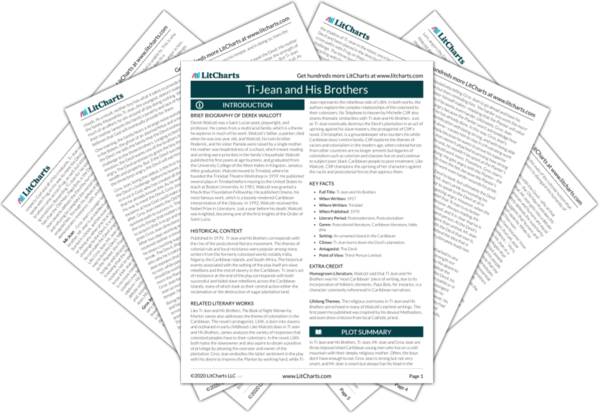In the play Ti-Jean and his Brothers, Derek Walcott tells the story of three brothers with whom the Devil makes a bet: if the Devil is able to anger any of the brothers, he will kill him, while any brother that can provoke a response of anger in the Devil will be granted wealth and property. One of the Devil’s disguises in the play is the Planter, a wealthy white plantation owner in the Caribbean who overworks his employees. The Planter embodies a capitalist value system in that he prioritizes accumulating profit over the wellbeing of his workers. Through his descriptions of the ways in which Gros Jean and Ti-Jean engage with the Planter, Walcott highlights how capitalism dehumanizes the working class, and how, consequentially, the working class can only liberate itself by rejecting capitalist values. When disguised as the Planter, the Devil reveals many beliefs that speak to his capitalist value system. By linking capitalism with the Devil, Walcott suggests that capitalism itself is evil.
When Gros Jean is taking his smoke break, he remembers how the Old Man had advised him to go and work for the Devil, saying, “Working for the Devil [is] the shortest way to success.” Here, the Old Man’s advice assumes that Gros Jean has a very capitalistic view of success: clearly, if success were defined as achieving wisdom or morality, working for the Devil would not be the quickest way to achieve it. However, as the Old Man assumes correctly that Gros Jean is seeking worldly status and possessions—markers of success under capitalism—it is true that working for the Devil is the quickest way to achieve these things. In his conversation with Gros Jean, the Devil (disguised as the Planter) apologizes for trying to get him to continue working when he is tired, saying, “Sometimes we people in charge of industry forget that you people aren’t machines.” Here, Walcott references the undervaluing of human workers under capitalism. The Devil forgets that his workers are not machines because fundamentally, he wishes they were, and he would rather not account for the limitations that the workers’ humanity places on their productivity. This is a dehumanizing view of his workers, and in highlighting it, Walcott speaks to the violence that underlies capitalism.
While Gros Jean willingly subjects himself to the Planter’s abusive treatment, Ti-Jean refuses to fulfill the Planter’s cruel requests that he overwork himself. In working on the plantation, Gros Jean loses the bet to the Devil, who is disguised as the Planter. Gros Jean becomes frustrated with the Planter’s implication that he could be working harder and shouldn’t have taken a break. Because Gros Jean prides himself on his strength, he wants to prove his worth according to capitalism’s value system: he wishes to be the most productive worker on the plantation. As a result of this desire—which is inextricably linked to capitalism—Gros Jean gets angry when the Planter points out that he doesn’t meet capitalism’s standards of being a successful worker. Therefore, Gros Jean’s willingness to let the capitalist value system define him leads to his downfall.
Ti-Jean demonstrates opposite behavior. The Planter tasks him with capturing a goat that continuously runs away, and Ti-Jean gives up, saying, “I got a bit tired chasing the goat / I’m human you know.” Here, Ti-Jean, unlike his older brother, is not ashamed of the limitations that being human places on his productivity. This suggests that Ti-Jean has not bought into the capitalist value system; unlike Gros Jean, he doesn’t think that his worth is directly correlated with his productivity. While Gros Jean attempts to succeed under this system, Ti-Jean defies it. His refusal to endlessly chase after the goat is only the beginning of his resistance: when the Planter asks Ti-Jean to count all of the sugar cane leaves on the plantation, Ti-Jean orders the plantation workers to burn down all of the crops, as well as the Planter’s house. In destroying the plantation, Ti-Jean destroys the Planter’s ability to subjugate his workers to cruel treatment. This, in turn, angers the Devil, and Ti-Jean wins the bet.
Ti-Jean is able to defeat the Devil essentially because he refuses to play by the Devil’s rules. He recognizes that the system the Devil has set up—that is, capitalism—is inherently unfair, and therefore rather than subjugating himself to it, he destroys it. In the process, he liberates not only himself, but all of the other works who were subject to the Planter’s abuse.
Capitalism and Dehumanization ThemeTracker

Capitalism and Dehumanization Quotes in Ti-Jean and His Brothers
“Remember what the old son of a leaf-gathering beggar said? He said that working for the Devil was the shortest way to success. Well, I walked up through the bush then I come onto a large field. Estate-like, you know. Sugar, tobacco, and a hell of a big white house where they say the Devil lives. Ay-ay. So two next black fellers bring me up to him. Big white man, his hand cold as an axe blade and his mind twice as sharp.”

Unlock explanations and citation info for this and every other Ti-Jean and His Brothers quote.
Plus so much more...
Get LitCharts A+“Sorry, sorry, Gros Jean, sometimes we people in charge of industry forget that you people aren’t machines. I mean people like you, Hubert…”
“Descendant of the ape, how eloquent you have become! How assured in logic! How marvelous in invention! And yet, poor shaving monkey, the animal in you is still in evidence...”
“You have told me yourself our lives are not ours, that no one’s life is theirs husband or wife, father or son, that our life is God’s own.”











